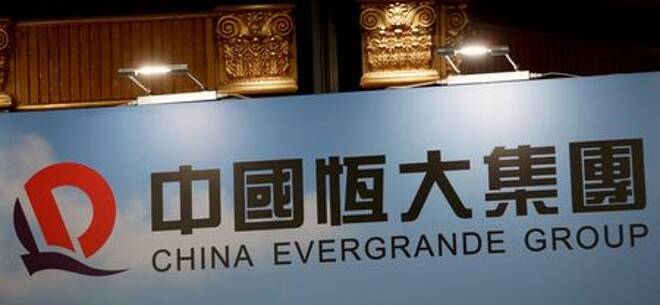Advertisement
Advertisement
China Evergrande Bonds Suspended as Prices Slump
By:
The Shanghai Stock Exchange said in a statement that it had temporarily suspended trading in China Evergrande Group's 6.98% July 2022 corporate bond
The Shanghai Stock Exchange said in a statement that it had temporarily suspended trading in China Evergrande Group’s 6.98% July 2022 corporate bond following “abnormal fluctuations.” The exchange had also suspended trading in the bond on Friday.
Shanghai exchange data showed the bonds sliding more than 25% to a low of 40.18 yuan after the resumption of trade on Monday afternoon, reflecting investor doubts that Evergrande will be able to repay investors in full on the bond’s maturity next year.
The company’s 5.9% May 2023 Shenzhen-traded bond, which was also suspended from trading, fell more than 35% after trading resumed on Monday afternoon.
The slump in bond prices on Monday comes after China Securities Depository and Clearing Co. (CSDC) on Friday effectively erased their value for use in collateral repo trading by reducing the “conversion ratio” of the July 2022 bond to zero, effective Sept. 7.
Other Evergrande bonds, including the May 2023 Shenzhen bond, had been included on a CSDC table of conversion ratios on Thursday for use on Sept. 6, but were not included in Friday’s table.
The conversion ratio determines leverage limits for repo financing given a specific bond pledged as collateral. CSDC is owned by the Shanghai and Shenzhen stock exchanges.
A director at a local brokerage said that the reduction in the conversion ratio was a “grey rhino” – a highly obvious yet ignored threat. “It was bound to happen.”
China Evergrande declined to comment.
Worries surrounding Evergrande, which has been scrambling to raise funds to pay lenders and suppliers, have spilled into broader concerns that a debt crisis could send shockwaves through China’s banking system.
On Friday, an index of high-yield Chinese dollar issuers fell to its lowest level since spring 2020.
For a look at all of today’s economic events, check out our economic calendar.
(Reporting by Andrew Galbraith; Additional reporting by Clare Jim in Hong Kong; Editing by Shri Navaratnam and Emelia Sithole-Matarise)
About the Author
Reuterscontributor
Reuters, the news and media division of Thomson Reuters, is the world’s largest international multimedia news provider reaching more than one billion people every day. Reuters provides trusted business, financial, national, and international news to professionals via Thomson Reuters desktops, the world's media organizations, and directly to consumers at Reuters.com and via Reuters TV. Learn more about Thomson Reuters products:
Advertisement
